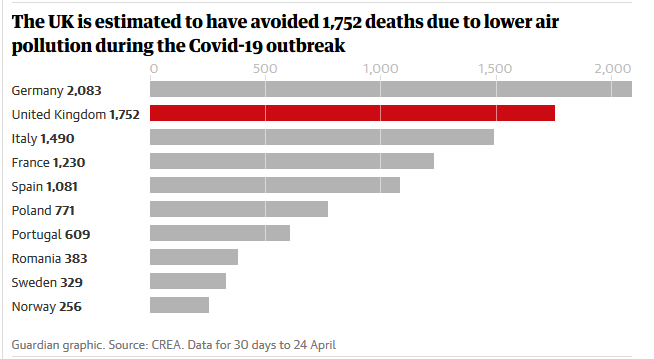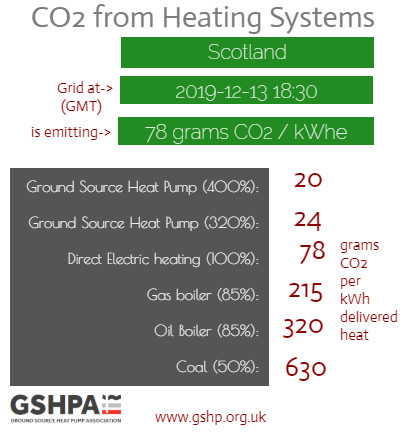Covid-19 Silver Lining:
reduced deaths from air pollution
1 May 2020
The improvement in air quality over the past month of the coronavirus lockdown has led to 11,000 fewer deaths from pollution in the UK and elsewhere in Europe, a study has revealed.
Sharp falls in road traffic and industrial emissions have also resulted in 6,000 fewer children developing asthma, 1,900 avoided emergency room visits and 600 fewer preterm births, according to the Centre for Research on Energy and Clean Air.
While the pandemic continues to take a terrible toll the authors of the report say the response has offered a glimpse of the cleaner, healthier environment that is possible if the world shifts away from polluting fossil fuel industries.

Compared with the same period last year, levels of nitrogen dioxide have fallen by 40% while tiny particulate matter is down 10%, which means that people without Covid-19 can breathe more easily. These two forms of pollution, which weaken the heart and respiratory system, are together normally responsible for about 470,000 deaths in Europe each year.
While burning fuel for road transport is the largest contributor to nitrogen dioxide levels in major cities, burning gas for heating contributes up to 22% of the nitrogen oxide in London. This level will be sharply reduced as we move toward electric vehicles and using heat pumps instead of gas boilers for heating. Electric vehicles and electric heat pumps emit no nitrogen oxide at all.
The new research estimates how pollution levels are likely to have fallen using statistical models that combine data for air quality, weather conditions, emissions, population and disease prevalence.
They found the highest number of avoided pollution deaths in Germany (2,083), followed by the UK (1,752), Italy (1,490), France (1,230) and Spain (1,083). By disease, almost 40% of the fatality reductions were related to heart failure, 17% from lung ailments such as bronchitis and emphysema, and 13% each from strokes and cancer. The others were infections and diabetes.
The overall calculation of 11,000 avoided deaths is the most likely estimate from a series of computer analyses with results ranging as high as 20,000 and as low as 7,000.
Worldwide, the number of avoided pollution deaths will be much higher because this study focuses on one continent and one month, rather than going back to the start of the global pandemic in Wuhan six months ago. The world's two most populous and polluted nations, China and India, have experienced some of the sharpest falls in air pollution.
The study does not include deaths from coronavirus itself. Scientists believe air pollution increases the malignancy of the disease and some studies suggest the virus can attach to particulate matter, but the researchers behind the latest model said they did not have sufficient data to include this in their models.
The lead author of the analysis, Lauri Myllyvirta, said the fall in air pollution had reduced pressure on health services at an important time and shown how much of a difference air quality improvements can make. But he was wary of framing this as a benefit.
See Renewable Heating See Renewable Cooling


